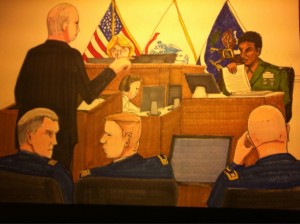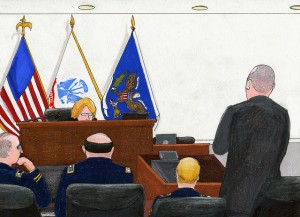Markin comment:
In 2007-2008 I, in vain,
attempted to put some energy into analyzing the blossoming American presidential
campaign since it was to be, as advertised at least, a watershed election, for
women, blacks, old white anglos, latinos, youth, etc. In the event I had to abandon
the efforts in about May of 2008 when it became obvious, in my face obvious,
that the election would be a watershed only for those who really believed that
it would be a watershed election. The four years of the Obama presidency, the
2012 American presidential election campaign, and world politics have only
confirmed in my eyes that that abandonment was essentially the right decision
at the right time. In short, let the well- paid bourgeois commentators go on and
on with their twitter. I, we, had (have) better things to do like fighting against
the permanent wars, the permanent war economies, the struggle for more and better
jobs, and for a workers party that fights for a workers government . More than
enough to do, right? Still a look back at some of the stuff I wrote then does not
a bad feel to it. Read on if you like
************
On Mitt Romney
A recent announcement out of
the Mitt Romney presidential campaign, apparently forced out of his vanishing
prospects in Iowa, has it that he will make a speech about his Mormon faith.
This prospect evokes, at least formally, the idea Jack Kennedy used in the 1960
presidential campaign about his Roman Catholicism as a way to cut across
anti-Catholic bigotry in a mainly Protestant country and to affirm his
commitment to a secular democratic state. Romney’s play is another kettle of
fish entirely. He WANTS to affirm that his Mormon beliefs rather than being
rather esoteric are in line with mainstream Protestant fundamentalist tenets.
In short, Jesus is his guide. Christ what hell, yes hell, have we come to when a major political party
in a democratic secular state has for all intents and purposes a religious test
for its nominee for president. A cursory glance at the history of 18th
century England and its exclusion clauses for Catholics and dissenters
demonstrates why our forbears rejected that notion. In any case, here is a
little commentary written earlier in the year that gives some thought into the
Mormons and particularly Brother Romney’s forbears. DOWN WITH RELIGIOUS TESTS
FOR POLITICAL OFFICE- DEFEND THE ENLIGHTENMENT
FIVE WIVES AT THE SAME TIME SHOW REAL EXECUTIVE
ABILITY-RIGHT?
In a recent interview on
CBS's Sixty Minutes Republican presidential hopeful ex- Massachusetts Governor
Mitt Romney, a professed Mormon, declared that he thought that the fact that
his great-grandfather took (or was ordered to take) five wives was ‘terrible’.
As the fiercely persecuted Mormons settled in Utah apparently the numerical balance
between men and women was off and polygamy was therefore encouraged. Naturally,
being a male-dominated religious variant of Christianity that necessary was
couched in theological terms, as well. The practice was officially banned by
that denomination in 1890. However, the practice, as witnessed by some recent
court cases in the West, still flourishes in some areas amount Old -Style
Mormons.
One can see that for someone
who is running on a ‘family values’ platform highlighted by support for the
proposition that marriage is between one man-one woman and is touting personal
fidelity to one wife and children in order to grab the brass ring of the
presidency that such a family history may in fact be 'terrible'. But step back a minute Mitt, aside from being
very disrespectful to your family line, what is the harm of having five, or for
that matter, ten wives? Or a woman having ten husbands? As long a there is
effective consent among and between the parties whose business is it anyway?
And why be ashamed of that ‘skeleton’ in the family closet?
We socialists are not as
squeamish as brother Romney appears to be about either the details of his
family history or about how people arrange their personal lives. There has been
a great hue and cry lately in the West over some Old- Style Mormon instances of
polygamy, including the usual allegations of coercion. Coercion or forcing
“shot gun” weddings, singly or in multiples, is not what we mean by effective
consent. However, absent coercion it is not the state’s business to interfere.
We may have a different take than Mormons on what we think personal
relationships will look like under socialism once the nuclear family (or what
today stands for that proposition) recedes into the background as the basis
unit of society but for now the variety of human experiences in interpersonal
relationships is way beyond the scope of what the state needs to interfere in.
I, personally, want to learn more about old
Great-Grandpa Romney and Joseph Smith-the founder of Mormonism and a Free
Soiler candidate for office before he was murdered in the 1840’s. On the face
of it those individuals seem, unlike Mitt, interesting personalities. Certainly everyone must concede that old
Great-Grandfather Romney seems more interesting than his progeny. And had to
have more real executive ability than latter monogamous Romneys. Hell, I had my
hands full when, back in the days, I had two girlfriends at one time. Hands
Off the Old Style Mormons! Government Out of the Bedrooms!













 The
AFL-CIO is organizing State Federations and Central Labor Councils across the
country in a national day of action. Join the Greater Boston Labor Council and
MoveOn.Org on International Human Rights Day to send Congress a
message:
The
AFL-CIO is organizing State Federations and Central Labor Councils across the
country in a national day of action. Join the Greater Boston Labor Council and
MoveOn.Org on International Human Rights Day to send Congress a
message: